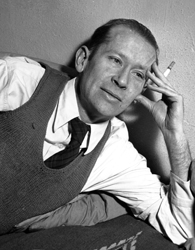American poet, novelist and painter E. E. Cummings was one of the best-selling poets of the 20th century, earning fame for his unique approach to punctuation and syntax.
E. E. Cummings’ Early Days
Edward Estlin Cummings was born on October 14, 1894, in Cambridge, Mass. His father was a Unitarian minister who encouraged his son to be creative. Cummings wrote a poem a day between the ages of 8 and 22. Cummings received his B.A. from Harvard University in 1915, and he earned his M.A. the following year. He was introduced to the work of Ezra Pound and other avant-garde writers while at Harvard. He began to experiment with punctuation, syntax and page layout, publishing his first poems in “Eight Harvard Poets” in 1917.
During World War I, Cummings volunteered to serve in a French ambulance corps. After serving just five months, he and his friend William Slater Brown were arrested in 1917 on suspicion of espionage. The pair spent the next four months in a prison camp before being released. Cummings’s experience in prison formed the basis for his first novel, “The Enormous Room” (1922). Just a few months after returning home to America, Cummings was drafted into the Army, serving at Fort Devens, Massachusetts, until the end of the war in 1918.
Sources in this Story
- Poetry Foundation: E. E. Cummings (1894–1962)
- University of Illinois at Urbana Champaign (American National Biography Online): E. E. Cummings’ Life
- Biography.com: E(dward) E(stlin) Cummings Biography
- The American Academy of Poets: E. E. Cummings
- The Washington Post: ‘E. E. Cummings: A Biography’
- Dictionary of Unitarian and Universalist Biography: E. E. Cummings
- The Paintings of E. E. Cummings
Cummings’ Notable Accomplishments
After the war, Cummings divided his time between New York and Paris, writing poetry in New York and studying art in Paris. In 1923, he published his first volume of poetry, “Tulips and Chimneys,” followed by “&” (1925), “XLI Poems” (1925), “ViVa” (1931), “No Thanks” (1935) and many others.
The Academy of American Poets offers several of Cummings’ poems online, which exemplify his unusual approach toward syntax and punctuation. Biographer Christopher Sawyer-Lauçanno describes Cummings’ unique style: “[T]he uncapitalized ‘i’; the use of parentheses and the ampersand; the spacing for visual and aural purposes; the punctuation for effect; the running of words together to create a wholeness out of separateness…And yet these are not just tricks for the sake of a unique semantic; the saying is integral to the meaning.”
Many readers believe that Cummings’ idiosyncratic punctuation extended to the way he spelled his own name; in fact, it was his publishers who began attributing his poems to “e.e. cummings.”
The 1920s and ’30s were a traumatic period for Cummings. The sudden death of his father in a car accident in 1926, and two failed marriages led to a shift in the themes and mood of his writing, resulting in works that reflect a preoccupation with the issues of life and death.
In 1932, Cummings met Marion Morehouse, who eventually became his common-law wife, and the couple began traveling the world. He continued to publish poetry during this period, and also produced the 1933 novel “Eimi” about his experiences traveling in Russia.
The Man and his Work
- “100 Selected Poems”
- “The Enormous Room”
- “Eimi: A Journey Through Soviet Russia”
- “Dreams in the Mirror: A Biography of E.E. Cummings” by Richard S. Kennedy
The Rest of the Story
Cummings took his painting just as seriously as his poetry; although the latter usually overshadows the former, he did produce some critically acclaimed work. The first half of his painting career focused on cubism and abstraction, while the second half focused on more representational portraiture and landscapes. At the time of his death, he left a large estate of paintings.
Cummings spent the last decade of his life in New York. He gave college lecture tours and enjoyed his success as the second most popular poet in America, surpassed only by Robert Frost. He received many honors during his lifetime, including two Guggenheim Fellowships and the Bollingen Prize in Poetry.
Cummings died on September 3, 1962, at his family’s summer retreat in New Hampshire.
This article was originally written by Caleb March; it was updated October 17, 2017.











